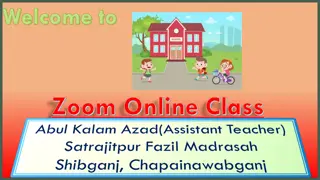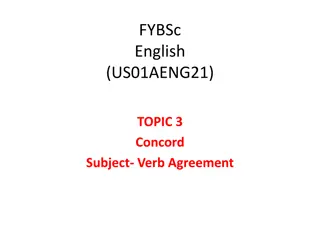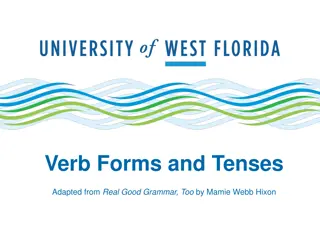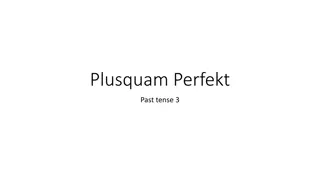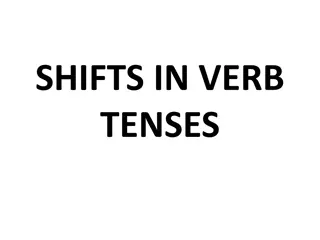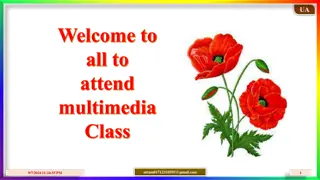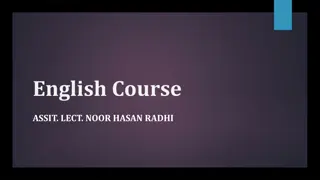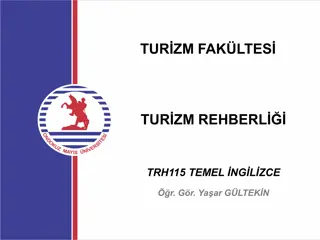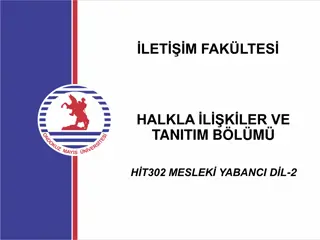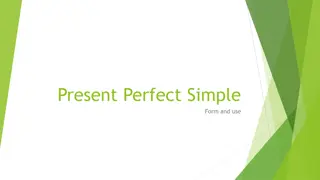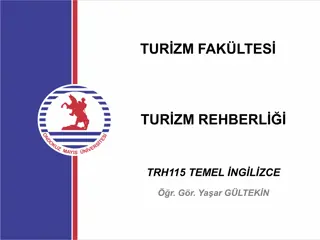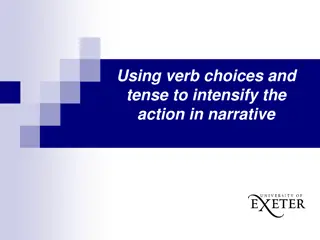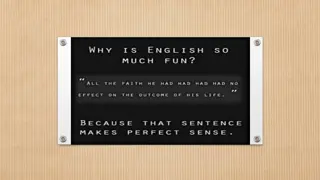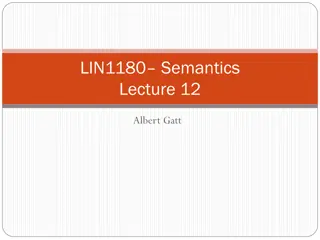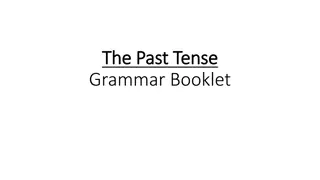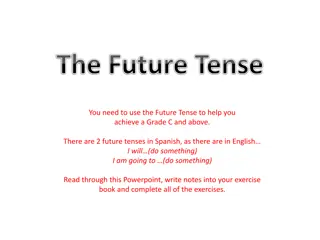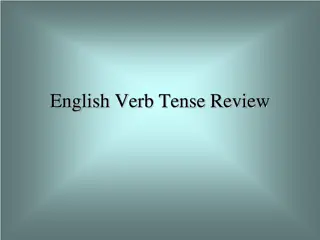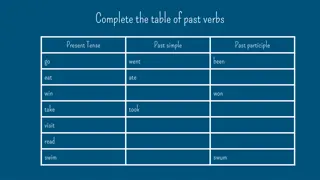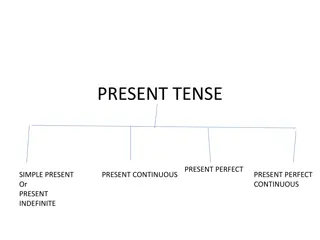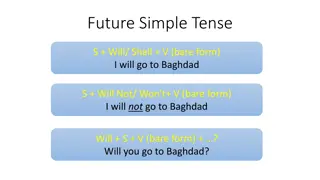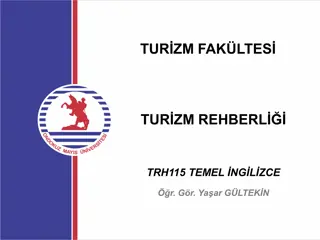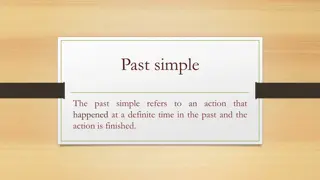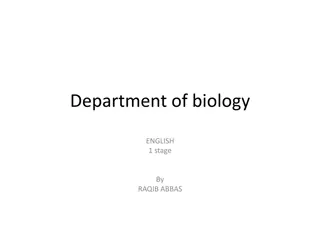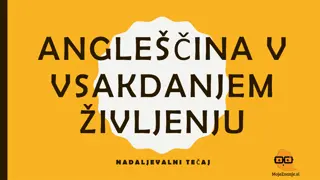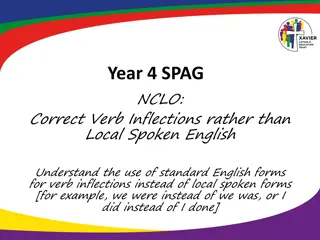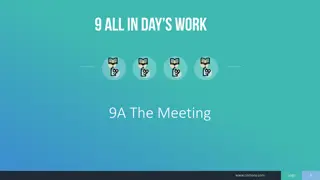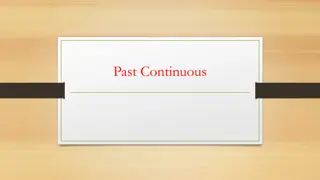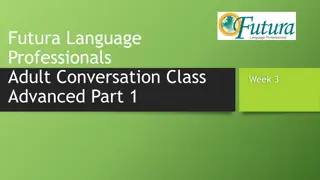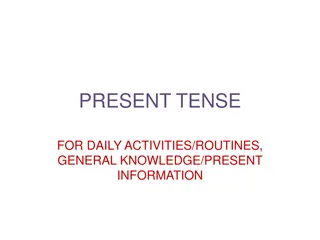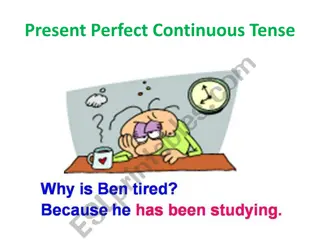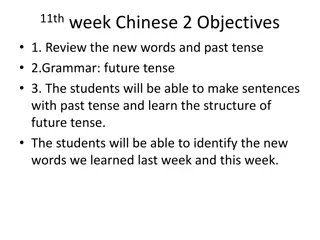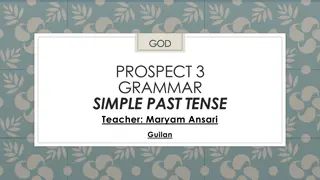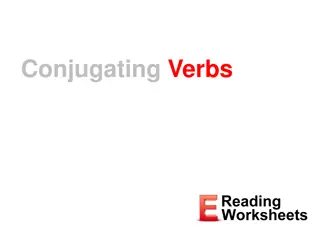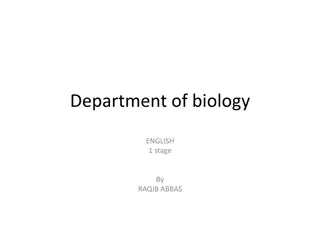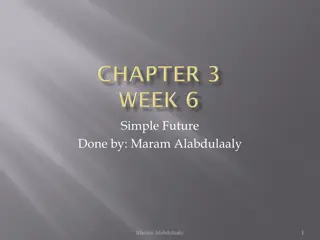Learn Past Continuous Tense - Grade 6 English Lesson
This Grade 6 English lesson focuses on understanding and correctly using the past continuous tense. It covers the rules for forming the past continuous tense, examples of its usage, and an assessment to test comprehension. Students will practice talking about actions happening at specific times in t
4 views • 6 slides
Understanding Tense in English Grammar
Explore the different types of tenses such as Present, Past, and Future Tense along with their classifications like Present Indefinite Tense, Past Continuous Tense, and Future Perfect Tense. Learn how to form positive and negative sentences in each tense with examples. Enhance your knowledge of Engl
2 views • 19 slides
Understanding Subject-Verb Agreement in English Sentences
Subject-verb agreement is crucial in English grammar to ensure sentences are grammatically correct. The subject of a sentence must agree with the verb in terms of gender, number, person, and case. Incorrect use of verb can lead to ungrammatical sentences. Learn how the subject and verb should match
0 views • 28 slides
Understanding Verb Forms and Tenses in English Grammar
Learn about verb forms and tenses in English grammar, including the five forms of every English verb, the differences between regular and irregular verbs, and how to use verb tenses such as present, present perfect, and present participle. Discover how to apply present tense in various contexts and
1 views • 15 slides
Understanding Plusquamperfekt Tense in German Grammar
The Plusquamperfekt tense in German is used to refer to actions that happened before another event in the past. This tense requires the past participles of haben and sein, such as hatte, war. Subordinating conjunctions like als, bevor, nachdem are used to establish a timeline of events. Conjunctions
3 views • 4 slides
Correcting Verb Tense Errors in Sentences
Correct the verb tense errors in sentences by matching verbs to their appropriate tense. Practice identifying and fixing inconsistencies in verb tenses for improved grammar accuracy.
0 views • 33 slides
Understanding Regular and Irregular Verbs in Simple Past Tense
Learn how to form the simple past tense with regular and irregular verbs. Regular verbs end in "-ed," while irregular verbs have unique past tense forms. Examples and images illustrate the differences, helping you master past tense verb usage effortlessly.
0 views • 11 slides
Understanding Tense in Communication Skills Course - Key Features and Clarifications
Explore the significance of tense in communication skills with Dr. Sarla Verma's virtual class for Diploma 1st-year students. Learn about verb forms, concepts of time, simple present tense, and highlights of present simple and continuous tenses. Understand temporary and permanent situations through
2 views • 24 slides
Understanding Subject-Verb Agreement in English Grammar
In this multimedia class session, Assistant Head-teacher Uttam Adhikary introduces the concept of subject-verb agreement, emphasizing the importance of matching singular subjects with singular verbs and plural subjects with plural verbs. Through engaging examples and presentations, students will lea
0 views • 41 slides
Understanding the Past Perfect Tense in English Grammar
The Past Perfect Tense is used to talk about actions completed before a certain point in the past, emphasizing the sequence of events. This tense follows the structure of "had + past participle" and is crucial for expressing events that happened earlier than others in a narrative. Knowing how to for
0 views • 27 slides
Understanding Subject-Verb Agreement in English Sentences
Explore the concept of subject-verb agreement through examples about the human body. Learn about singular and plural nouns affecting verb usage, common patterns in verb endings, and exceptions to verb conjugation rules in English sentences.
0 views • 15 slides
Understanding Simple Past Tense in English: Rules and Examples
The simple past tense is a fundamental form in Modern English used to describe past events. It involves regular verbs adding "-ed" and irregular verbs having different forms. The construction of the simple past helps distinguish it from other past tense forms like past perfect and past progressive.
0 views • 33 slides
Learn English Grammar - Present Continuous Tense Practice
This content provides a detailed overview and practice exercises on the Present Continuous Tense in English grammar, focusing on passive voice constructions. Various examples illustrate the formation and usage of this tense, reinforcing understanding through images and exercises. Whether you are a s
0 views • 12 slides
Understanding the Present Perfect Simple Tense and Its Usage
Learn about the basic rules, formation, and usage of the Present Perfect Simple tense in English. Explore how to form the tense, use shortened forms, understand when to use "have" and "has" with past participles, differentiate between Present Perfect and Past Simple, know when to use the Present Per
0 views • 11 slides
Understanding the Present Perfect Tense in English Grammar
The present perfect tense in English grammar is a combination of the present tense and perfect aspect used to express past events with present consequences. It is formed using the auxiliary verb "have" and the past participle of the main verb. This tense is essential for indicating completed actions
0 views • 27 slides
Enhancing Narrative Intensity through Verb Choices and Tense
Explore the use of verb choices and tense to intensify the action in narratives. Discover how authors create vivid, powerful scenes through deliberate language selection. Learn the principles of LEAD to effectively connect grammar with meaning and writing. Analyze authentic texts to notice patterns
0 views • 7 slides
Understanding Future Progressive Tense in English Grammar
Future Progressive Tense, also known as Future Continuous Tense, is used to indicate actions that will be ongoing at a specific point in the future. This tense emphasizes the continuous nature of an action happening in the future. Learn how to form and use the Future Progressive Tense through exampl
0 views • 22 slides
Understanding Tense and Grammatical Aspect in Language
This lecture delves into the intricacies of tense and grammatical aspect, exploring concepts such as progressive/non-progressive, perfective/imperfective aspects across languages. It discusses the interaction between grammatical aspect and lexical aspect (Aktionsart), focusing on tense as a deictic
0 views • 43 slides
Mastering the Past Tense: A Comprehensive Grammar Guide
Dive into the intricacies of forming the past tense in English with this detailed booklet. Learn the rules for regular verb conjugation, explore examples, and practice with engaging exercises. Sharpen your language skills and gain confidence in using the past tense accurately.
0 views • 10 slides
Mastering the Future Tense in Spanish
Learn how to use the future tense in Spanish to improve your language skills and achieve better grades. Explore the two future tenses in Spanish, the near future structure with "ir + infinitive," and the simple future with verb endings. Practice translating sentences to and from Spanish to strengthe
0 views • 9 slides
English Verb Tense Review: Simple Present and Simple Past
Simple Present Tense is used for habitual actions, unchanging truths, and general statements of fact. It is indicated by words like always, usually, and sometimes. Simple Past Tense is used for completed actions and past habits indicated by words such as yesterday and last night. The forms and indic
0 views • 46 slides
Learning Past Verbs and Present Perfect Tense
This content discusses past tense verbs through completing tables, giving examples, and exploring the present perfect simple tense with real-world scenarios. It covers verb conjugations in the past tense, such as went, ate, won, took, and swam, along with explanations and exercises related to the pr
1 views • 14 slides
Understanding Simple Present Tense and Its Usages
Simple Present Tense is used for habits, routines, and permanent truths. This tense follows a specific structure for positive, negative, and interrogative sentences. Through examples and exercises, learn how to correctly use Simple Present Tense in everyday conversations.
0 views • 8 slides
Understanding Future Simple Tense in English Grammar
The Future Simple Tense in English is used to express decisions made at the moment of speaking, announce planned future events, show willingness or unwillingness for future actions, express thoughts, and talk about events certain to happen. It is often accompanied by adverbs to indicate timing. Ques
0 views • 11 slides
Understanding Future Tense in Grammar
Future tense in grammar signifies events that have not occurred yet but are expected to happen in the future. While English lacks a distinct future tense form, it expresses future events through auxiliary verbs like will, shall, and going to. Relative tense, on the other hand, compares time referenc
0 views • 28 slides
Understanding the Past Simple Tense in English Grammar
The past simple tense refers to actions that occurred at a specific time in the past and are now completed. This tense follows a specific rule where the subject is combined with a verb (regular or irregular) and a complement. Adverbs like "yesterday," "ago," and "last" are commonly used with past si
0 views • 9 slides
Understanding Past Simple Tense in English Grammar
The past simple tense is used to describe completed actions or events that happened at a specific time in the past. Regular verbs form the past simple by adding "-ed", while irregular verbs have unique past tense forms. The structure for negative and question forms involves the auxiliary verb "did".
0 views • 6 slides
Understanding Present Continuous Tense in English Grammar
Explore the present continuous tense in English grammar through examples and explanations. Learn how to form positive, negative, and question sentences in this tense, as well as common uses such as actions happening now, future plans, temporary situations, and habitual actions. Enhance your grasp of
0 views • 50 slides
Understanding Verb Inflections in Standard English
Verbs are essential in language as doing words, representing actions and states of being. Verb inflections involve changes in form based on tense, number, and person. Standard English ensures clear communication by using correct verb forms. Practice identifying correct verb inflections for "to be" t
0 views • 14 slides
Understanding Verb Tense in English Grammar
Explore the concept of verb tense in English grammar with examples and explanations. Learn about present indefinite tense, subject-verb agreement, past forms of verbs, and more to enhance your understanding of grammar.
0 views • 19 slides
Understanding Present Continuous Tense and Verb Forms
The content discusses the Present Continuous Tense, consisting of the verb "be" and the suffix "-ing", its uses in describing ongoing actions at the moment of speaking, planned future events, temporary actions or habits, and expressing irritation. It also covers verb forms with examples and rules fo
0 views • 22 slides
Learn Past Continuous Tense Through Examples
Explore the past continuous tense through examples including formation, negative sentences, questions, and exercises. Understand how to use "was/were" with verbs ending in -ing. Practice with exercises to enhance your understanding of this verb tense.
0 views • 6 slides
Advanced Spanish Preterite Tense Irregular Verbs and Conjugations
Dive into advanced Spanish conversation with a focus on preterite tense irregular verbs and conjugations. Practice sentence translations, engage in conversation exercises using the preterite tense, learn new vocabulary, and review general notes for past tense usage in Spanish. Explore the conjugatio
0 views • 11 slides
Present Tense: Daily Activities & Information
Explore the present tense for daily routines, general knowledge, and current information in this informative content. Discover what activities are usually done on Saturday evenings and Sunday mornings, learn about the ministers in charge of Maritime and Fisheries Affairs and Agriculture, and get fam
0 views • 10 slides
Understanding the Present Perfect Continuous Tense
The Present Perfect Continuous Tense is used to emphasize the duration of an action that started in the past and continues up to the present, indicating ongoing actions with time expressions like 'for,' 'since,' 'all morning,' etc. Learn how to use this tense correctly and distinguish it from the Pr
1 views • 10 slides
Chinese Language Learning Objectives for 11th Week - Reviewing New Words and Future Tense
This instructional plan outlines the objectives for the 11th week of a Chinese language course. Students will review new vocabulary words and past tense, learn about the future tense, practice making sentences, and prepare for presentations. The content includes Monday's objectives, a review of new
0 views • 12 slides
Understanding Simple Past Tense in Grammar
In this file, we delve into the concept of simple past tense in grammar. Through examples and explanations, you will learn how to use the simple past tense to talk about completed actions in the past. The structure, usage, and importance of simple past tense are covered extensively to enhance your u
0 views • 30 slides
Understanding Verb Conjugation in Grammar
Explore the world of verb conjugation in grammar, from changing verb forms to show time and tense to ensuring subject-verb agreement. Learn about helping verbs, statements contrary to fact, and how verb conjugation indicates completion. Dive into this essential aspect of language to enhance your und
0 views • 18 slides
Department of biology
The present continuous tense, also known as the present progressive tense, is used to describe ongoing actions or events happening in the present. It is formed by using the present tense of the verb "to be" followed by the -ing form of the main verb. Learn about forming positive, negative, and quest
0 views • 5 slides
Understanding Simple Future Tense in English Grammar
Simple Future Tense is used to express actions that will happen in the future. It is formed using "will" or "be going to" and can also involve expressions like "shall." This tense is used for predictions, plans, willingness, and decisions made at the moment of speaking. Learn how to form affirmative
0 views • 20 slides

